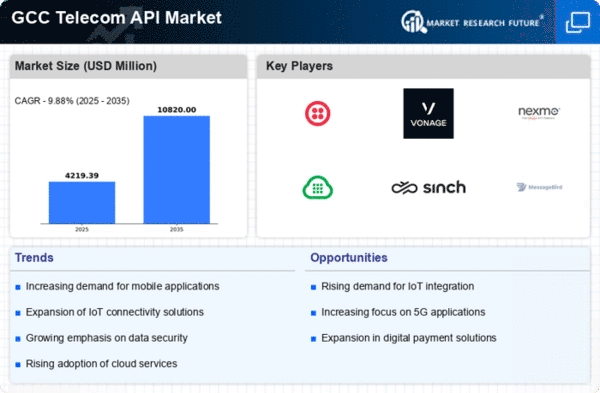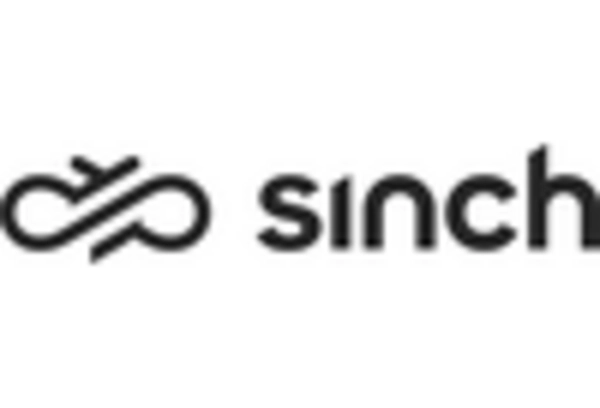Adoption of IoT Solutions
The integration of Internet of Things (IoT) technologies is significantly influencing the telecom api market in the GCC. With the number of connected devices projected to exceed 50 billion globally by 2025, the region is witnessing a rapid adoption of IoT solutions across various sectors, including smart cities, healthcare, and transportation. Telecom APIs play a crucial role in enabling communication between these devices, facilitating data exchange, and ensuring interoperability. As businesses increasingly seek to harness the potential of IoT, the demand for robust telecom API frameworks is likely to grow. This trend not only enhances operational efficiency but also opens new revenue streams for telecom operators, thereby driving the overall growth of the telecom api market.
Rising Mobile Penetration
The telecom api market in the GCC is experiencing a notable surge due to the increasing mobile penetration rates across the region. As of 2025, mobile subscriptions in the GCC have reached approximately 100 million, representing a penetration rate of over 130%. This growth is driving demand for innovative telecom API solutions that enhance user experiences and facilitate seamless connectivity. Telecom operators are leveraging APIs to offer value-added services, such as mobile payments and location-based services, which are becoming essential in a highly competitive market. The rising mobile penetration not only expands the customer base but also encourages the development of new applications and services, thereby propelling the telecom api market forward.
Emergence of 5G Technology
The rollout of 5G technology in the GCC is poised to revolutionize the telecom api market. With 5G networks expected to cover over 90% of the region by 2026, the demand for APIs that can support high-speed, low-latency applications is increasing. This new generation of mobile technology enables advanced use cases such as augmented reality, virtual reality, and real-time data analytics, which require robust API frameworks for seamless integration. Telecom operators are likely to invest in developing APIs that can leverage the capabilities of 5G, thereby enhancing service offerings and customer experiences. The emergence of 5G technology is anticipated to create new opportunities for innovation within the telecom api market, driving growth and competitiveness.
Investment in Digital Transformation
The ongoing digital transformation initiatives across the GCC are acting as a catalyst for the telecom api market. Governments and enterprises are investing heavily in digital infrastructure, with expenditures expected to reach $30 billion by 2026. This investment is aimed at enhancing connectivity, improving service delivery, and fostering innovation. Telecom APIs are integral to this transformation, enabling businesses to integrate various digital services and streamline operations. As organizations increasingly adopt cloud-based solutions and seek to enhance customer engagement through digital channels, the telecom api market is likely to benefit from this trend. The emphasis on digital transformation is expected to create a conducive environment for the growth of telecom APIs, facilitating the development of new applications and services.
Focus on Enhanced Customer Experience
The telecom api market is increasingly driven by the need for enhanced customer experience in the GCC. As competition intensifies among telecom operators, there is a growing emphasis on delivering personalized and efficient services. APIs enable operators to access customer data and preferences, allowing for the development of tailored solutions that meet individual needs. The market is witnessing a shift towards customer-centric approaches, with operators utilizing APIs to streamline service delivery and improve responsiveness. This focus on customer experience is likely to result in increased investments in API development, as companies seek to differentiate themselves in a crowded marketplace. Consequently, the telecom api market is expected to grow as operators prioritize customer satisfaction and loyalty.
















